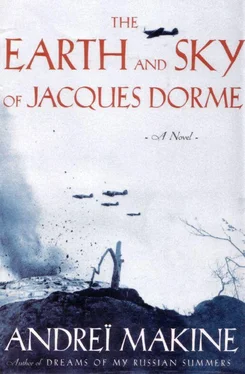Andrei Makine - The Earth And Sky Of Jacques Dorme
Здесь есть возможность читать онлайн «Andrei Makine - The Earth And Sky Of Jacques Dorme» весь текст электронной книги совершенно бесплатно (целиком полную версию без сокращений). В некоторых случаях можно слушать аудио, скачать через торрент в формате fb2 и присутствует краткое содержание. Жанр: Современная проза, на английском языке. Описание произведения, (предисловие) а так же отзывы посетителей доступны на портале библиотеки ЛибКат.
- Название:The Earth And Sky Of Jacques Dorme
- Автор:
- Жанр:
- Год:неизвестен
- ISBN:нет данных
- Рейтинг книги:3 / 5. Голосов: 1
-
Избранное:Добавить в избранное
- Отзывы:
-
Ваша оценка:
The Earth And Sky Of Jacques Dorme: краткое содержание, описание и аннотация
Предлагаем к чтению аннотацию, описание, краткое содержание или предисловие (зависит от того, что написал сам автор книги «The Earth And Sky Of Jacques Dorme»). Если вы не нашли необходимую информацию о книге — напишите в комментариях, мы постараемся отыскать её.
Yet the tone of these earlier triumphs was sometimes too dependent on mystique, as if cashing in on the much-vaunted but dubious "Russian soul", a quality eminently exploitable by crass publishers like the one who allowed Makine's Once on the River Amur (a Siberian waterway) to be rendered as Once Upon the River Love.
Makine then found his true and necessary metier in a series of apparently slight novels that disclose profound insights into Russia's recent history. Requiem for the East and A Life's Music, his two most recent books, have given us a poignant and privileged understanding of what it was to be a Russian caught up in the Second World War.
AdvertisementAdvertisement
The rather awkwardly named The Earth and Sky of Jacques Dorme (it sounds no better in French) continues to piece together this mosaic, much in the way that the novels of Solzhenitsyn, when read in chronological order, bear witness to the terrible march of the Soviet regime.
But there the resemblance ends. Makine proceeds by glimpse and allusion; we don't realise, when we witness the vivid, stormy atmospherics of the first page, that this couple somewhere out on the steppe, swept away by urgent love-making in a strange bedroom that lacks a far wall, have seized a few precious hours from the Battle of Stalingrad raging 70 miles away.
We don't know who they are, how they came together, or why they talk about France. The stateless man, who is piloting a Red plane, remarks mysteriously: "As for the English, I don't know whether we can count on them. But you know, it's like a battle in the air. It's not always the number of planes that decides it, nor even how good they are. How to explain? It's the air. Yes, the air. Sometimes you feel the air is supporting you, playing on your side. The air or heaven itself."
With these few words you realise this is no ordinary war story. Genre-wise, it turns out to be partly a quest novel: the woman goes on to befriend a little boy from an orphanage and beguiles him with tales about her French provenance, her Russian destiny and the few days of desperate love. The boy feels intimately connected to that tempestuous night and 50 years later determines to find the plane in which the man crashed and died.
His quest fulfilled, the boy, who has grown up to be a writer, tries to have an account of it published. His first encounter with a representative of the industry is bewildering and galling and leads, after his precipitous exit, to a superb meditation on the relationship of truth to fiction. Some historians, he reflects, dismissed the whole of War and Peace on the grounds that Tolstoy muddled some of the details regarding the Battle of Borodino. Makine's rebuttal lies precisely in the story he concocts, a factional tour de force brilliantly and incontrovertibly grounded in some of the most monumental events of the last century, yet fragmentary, impressionistic, and touchingly, passionately human in the telling. It is not only an exquisite pleasure to read, it is the best, because it is the most human kind of history.












